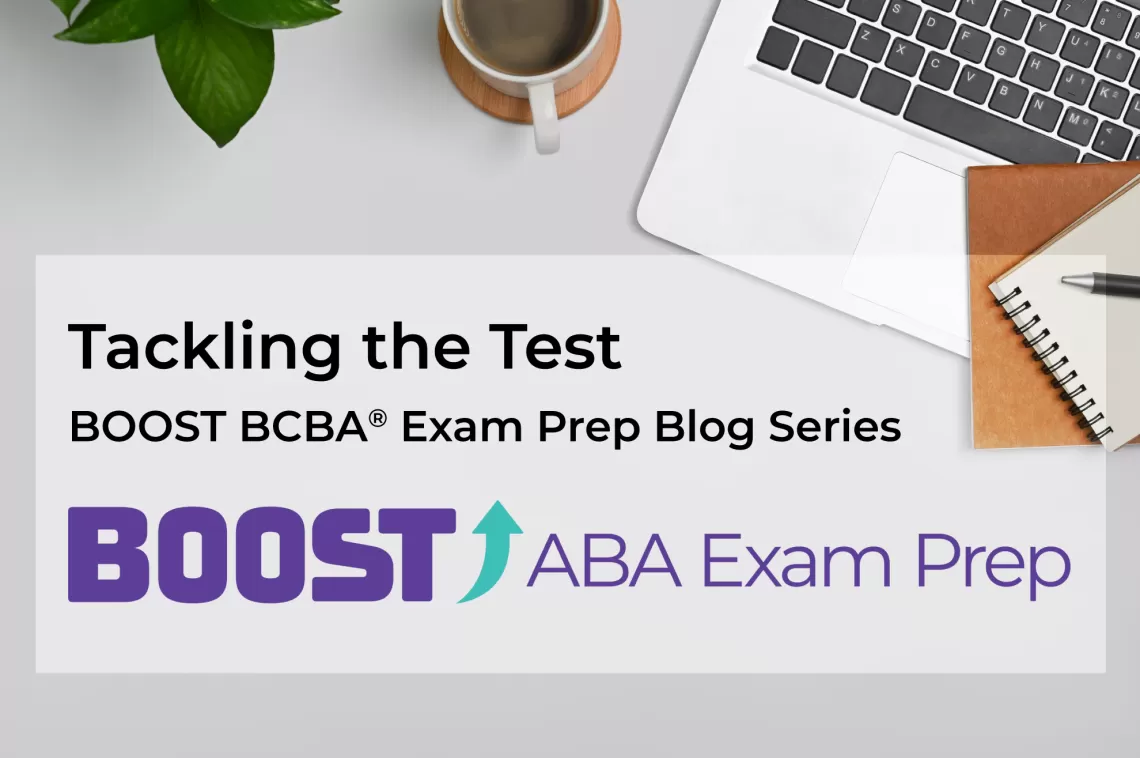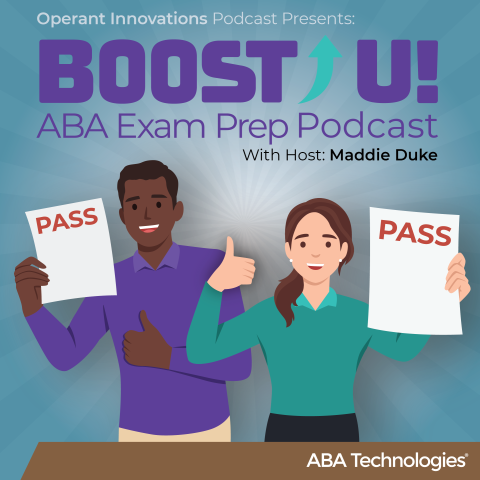
Conquering Test Anxiety with Behavioral Science - Tackling the Test Series
Part 10
Part 1: Intro to the Series
Part 2: First Steps for Preparing for the BACB® Exam
Part 3: Mock Exams for BCBA® Exam Prep
Part 4: Self-Management Strategies for BCBA® Exam Prep
Part 5: Study Methods that Work
Part 6: Beyond Rote Memorization
Part 7: 6 Ways to BOOST Your Study Time
Part 8: 10 Ways Your Friends and Family Can Help You Study for the BCBA® Exam
Part 9: Test-taking Strategies for the BCBA® Exam
Part 10: Conquering Test Anxiety with Behavioral Science
Becoming a Board Certified Behavior Analyst® (BCBA®) or Board Certified Assistant Behavior Analyst® (BCaBA®) is a rigorous journey. It requires completing a degree, over 200 hours of behavior-analytic coursework, 1000-2000 hours of supervised fieldwork, and passing the international BACB certification exam. This final step, the certification exam, often induces feelings of inadequacy and anxiety due to the pressure to pass on the first attempt. This blog provides strategies to help manage and overcome test anxiety using principles from behavioral science.
Understanding Test Anxiety
Non-behaviorists might describe anxiety as a psychological phenomenon. However, B.F. Skinner tells us:
As long as we conceive of the problem of emotion as one of inner states, we are not likely to advance a practical technology. It does not help in the solution of a practical problem to be told that…behavior is due to frustration or anxiety; we also need to be told how the frustration or anxiety has been induced and how it may be altered.
(Skinner, 1953 p.167).
To address anxiety, we need to treat it like any other behavior of interest. Understanding the variables that evoke and maintain anxiety is crucial for developing strategies to reduce these feelings.
Students of behavior analysis should be familiar with respondent conditioning, and competent behavior analysts understand that respondent and operant processes often interact in ways that can impact an individual’s life. The physical symptoms of anxiety include increases in heart rate, respiration, perspiration, and feelings of light-headedness or dizziness. The symptoms can function as powerful aversive stimuli, evoking avoidance behavior. Furthermore, other operant behavior can often be suppressed when these reflex responses are elicited. Anxiety might be considered a problem when desired performance is suppressed in the presence of triggering stimuli (Jones and Friman, 1999). Identifying the contributing factors to test anxiety is the first step in finding solutions.

Contributing Factors to Test Anxiety
High Stakes. High-stakes exams, like the BCBA or BCaBA certification exam, can induce significant anxiety because they represent a barrier to progressing into one’s chosen profession. The pressure to pass after investing years of time, money, and energy can make the exam feel like an insurmountable obstacle, contributing to students viewing it as “the Beast,” “the BIG exam,” and other intimidating names.
Fear of Failure. The pressure to perform well and the fear of disappointing ourselves or others can lead to heightened anxiety levels. Social media often contributes to this fear of failure through the sharing of negative testing experiences (i.e., failure posts) and negative talk, creating a culture of fear surrounding the exam.
Lack of Preparation. Feeling unprepared for the exam can significantly increase anxiety levels.
Perfectionism. Striving for perfection and negative self-talk can create undue stress and anxiety. Perfectionism can lead to hyperfocus on certain content areas while neglecting others, resulting in a sense of being overwhelmed and paralyzed by the magnitude of the task.
The Effects of Test Anxiety
Test anxiety can have a range of adverse effects, including:
- Reduced Concentration: Difficulty focusing during the exam
- Memory Impairment: Inability to recall information due to stress
- Negative Self-Image: Repeated experiences of test anxiety can negatively impact self-worth and abilities, leading to second-guessing and changing answers repeatedly.
- Impaired Performance: Underperforming compared to actual knowledge and abilities
Effective Strategies to Overcome Test Anxiety
Preparation is Key
Adequate preparation is one of the most effective ways to combat test anxiety. Here are some tips:
- Develop a Study Plan: Break down the material into manageable chunks and set aside regular study time. Build fluency, utilize effective study methods, use study time efficiently, and recruit friends and family to help.
- Use self-management techniques: Set yourself up for success with a study plan that maximizes self-management techniques.
- Practice Test-Taking Strategies: Diagram scenarios, eliminate incorrect answers, and flag challenging items. Having and practicing strategies to analyze items and tackle difficult questions will help calm your nerves and manage your time during the exam.
- Familiarize Yourself with the Exam: Review the BCBA or BCaBA handbook to understand the format and time constraints. Knowing what to expect on exam day can build confidence and reduce anxiety when the day comes.
Positive Self-Talk
Our thoughts can influence our responses. Replace negative self-talk with positive affirmations and avoid using fear-evoking labels. Reframe the exam as a test of minimum competencies, not an insurmountable challenge. Avoid social media traps that perpetuate fear and focus on your capabilities and past achievements.
Breathing Exercises and Mindfulness
Deep-breathing exercises and mindfulness techniques can calm the nervous system and reduce stress. Practice these strategies regularly to manage overall anxiety levels. Behavioral- mindfulness approaches, such as Acceptance and Commitment Therapy (ACT), can be particularly helpful.

Avoid Last-Minute Cramming
Trying to learn new material right before the exam can lead to information overload and increased anxiety. Instead, review key points and engage in self-care activities, such as a spa treatment or a favorite hobby, the day before the exam.
Conclusion
Test anxiety is a common challenge, but it is manageable. As students of behavior analysis, you have the knowledge and tools to control test anxiety. By understanding what evokes feelings of anxiety and implementing strategies to mitigate these effects, you can perform at your best.
May the Environment be with you!
References and Resources
Jones, K. M, & Friman, P. C. (1999), A case study of behavioral assessment and treatment of insect phobia. Journal of Applied Behavior Analysis, 32:95-98. https://doi-org.portal.lib.fit.edu/10.1901/jaba.1999.32-95
https://www.bacb.com/debunking-myths-about-bacb-examinations/
https://abatechnologies.com/blog/test-taking-strategies-for-the-bcbar-exam-tackling-the-test-series
Want more tips to help you pass the BCBA® Exam? Check out the BOOST U! Podcast!
